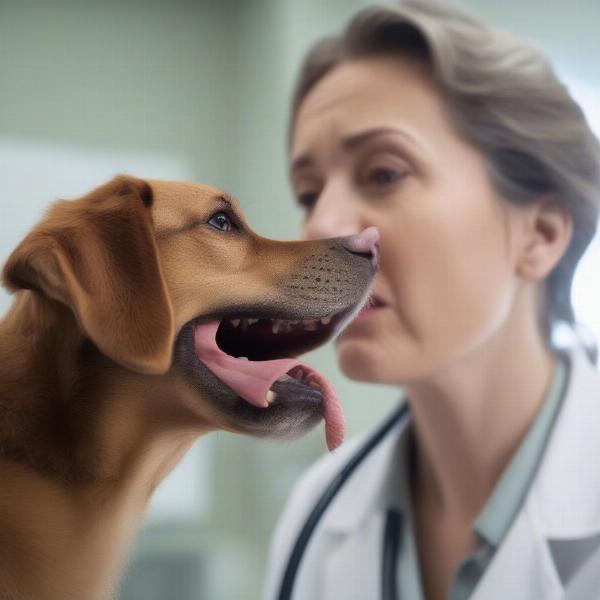A wry mouth in dogs, also known as a deviated snout or twisted mouth, is a facial deformity where the muzzle appears twisted or asymmetrical. This condition can range from barely noticeable to severely impacting a dog’s ability to eat, drink, and breathe. Understanding the causes, potential complications, and management strategies for wry mouth is essential for any dog owner, especially those considering breeds prone to this condition.
What Causes Wry Mouth in Dogs?
Wry mouth can be caused by a variety of factors, including genetics, injury during development, or in utero positioning. Certain breeds, like brachycephalic dogs (those with short noses, such as Bulldogs and Pugs), are more predisposed due to their facial structure. Injuries, particularly during puppyhood when facial bones are still developing, can also lead to wry mouth.
Potential Complications of Wry Mouth
While mild cases of wry mouth might be purely cosmetic, more severe deviations can lead to significant health issues. Difficulties with eating and drinking are common, as the misalignment can affect the dog’s ability to grasp food or lap water. Dental problems, such as malocclusion (misaligned teeth), are also more frequent in dogs with wry mouth. In severe cases, breathing difficulties can arise due to nasal passage obstruction.
Managing Wry Mouth in Dogs
The management of wry mouth depends largely on the severity of the condition. Mild cases may not require any specific treatment, while more severe cases might necessitate surgical intervention to correct the deformity. Supportive care, such as specialized feeding bowls and dental care, can improve a dog’s quality of life. Regular veterinary check-ups are crucial to monitor the condition and address any developing complications.
Living with a Wry Mouth Dog
Caring for a dog with wry mouth might require some adjustments to ensure their well-being. Patience and understanding are key, especially during mealtimes. Working closely with your veterinarian to develop a tailored management plan, including appropriate nutrition and dental care, can help your dog live a comfortable and happy life.
Is Wry Mouth Painful for Dogs?
While mild wry mouth is generally not painful, severe cases causing dental problems or breathing difficulties can be uncomfortable. Regular veterinary check-ups are essential to assess and manage any potential pain or discomfort.
Can Wry Mouth Be Prevented?
Preventing wry mouth caused by genetic factors can be challenging, especially in breeds predisposed to the condition. Choosing reputable breeders who screen for genetic health issues can reduce the risk. Protecting puppies from facial injuries during their developmental stages is also important.
 Wry Mouth Dog Undergoing a Veterinary Checkup
Wry Mouth Dog Undergoing a Veterinary Checkup
Wry Mouth in Puppies: Early Detection and Management
Wry mouth is often detected in puppies during their early development. Early detection and intervention are vital for managing this condition effectively. Working closely with your veterinarian can help you determine the best course of action for your puppy, which might include supportive care or surgical correction.
Conclusion
Wry mouth in dogs is a condition that requires careful consideration and management. Understanding the causes, potential complications, and available treatment options can help dog owners provide the best possible care for their pets. While it can present challenges, with proper management, dogs with wry mouth can live happy and fulfilling lives.
FAQ
- What is wry mouth in dogs? Wry mouth is a facial deformity where a dog’s muzzle appears twisted or asymmetrical.
- What causes wry mouth? It can be caused by genetics, injury, or in utero positioning.
- Is wry mouth painful? Mild cases are generally not painful, but severe cases can cause discomfort.
- How is wry mouth treated? Treatment depends on severity and can range from supportive care to surgery.
- Can wry mouth be prevented? Preventing genetically caused wry mouth can be challenging, but choosing reputable breeders can help reduce the risk.
- What are the long-term implications of wry mouth? Long-term implications can include dental problems and difficulty eating or breathing.
- How can I manage a dog with wry mouth? Work closely with your veterinarian to develop a tailored management plan.
Looking for expert advice on dog breeds, health, training, nutrition, grooming, or accessories? ILM Dog offers a wealth of resources for dog owners worldwide. Contact us for personalized guidance: Email: [email protected], Phone: +44 20-3965-8624. Visit our website at ILM Dog for more valuable information on dog care and well-being.